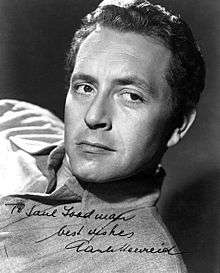Paul Henreid
| Paul Henreid | |
|---|---|
 circa 1940s | |
| Born |
Paul Georg Julius Freiherr von Hernried Ritter von Wassel-Waldingau[1] 10 January 1908 Triest, Austria-Hungary (now Trieste, Italy) |
| Died |
29 March 1992 (aged 84) Santa Monica, California, U.S. |
| Cause of death | Pneumonia |
| Occupation | Actor, director |
| Years active | 1933-1992 |
| Spouse(s) |
Elizabeth "Lisl" Camilla Julia Gluck (1936-1992) (his death) 2 children |
| Children |
Monika Henreid Mimi Duncan |
Paul Henreid, born Paul Georg Julius Freiherr von Hernried Ritter von Wasel-Waldingau[1](10 January 1908–29 March 1992) [2] was an Austrian-born American actor and film director.
Early life
Born in the city of Trieste, then part of the Austro-Hungarian Empire (now Trieste, Italy), Henreid was the son of Maria-Luise (Lendecke) and Baron Carl Alphons, an aristocratic Viennese banker.[3]
Early acting career
He trained for the theatre in Vienna and debuted there on the stage under the direction of Max Reinhardt. He began his film career acting in German films in the 1930s.
England
In 1935 he emigrated from Austria to Great Britain one year after the 1934 Austrian Civil War which ended with installation of Austrofascism. With the outbreak of the World War 2, Henreid risked deportation or internment as an enemy alien in the United Kingdom, but Conrad Veidt spoke on his behalf with the British Governmental authorities assuring them of Hernried's hostility to the Third Reich and he was allowed to remain at liberty and work in England's film industry.[4] A supporting role in Goodbye, Mr. Chips (1939), and third billing and charismatic performance as a Nazi espionage agent in the thriller Night Train to Munich (1940), led to an offer of employment in Hollywood in 1942, and he departed for the U.S.A.
Hollywood
Having arrived in Hollywood he was contracted with RKO, the Studio changing his surname, dropping the "von" and the first "r", and reversing the order of the "i" and "e". His first film for RKO was Joan of Paris (1942). Shortly after his arrival Henreid appeared in two key films in his career. In Now, Voyager alongside Bette Davis he created one of cinema's most imitated scenes, in which he lights two cigarettes and hands one to her. Henreid's next role was as Victor Laszlo, heroic anti-Nazi leader, in Casablanca with Humphrey Bogart and Ingrid Bergman. In 1946, Henreid became a citizen of the United States.[5]
He made regular film appearances throughout the 1940s, and in the early 1950s began directing for both film and television. His film credits include Between Two Worlds (1944), The Spanish Main (1945), Of Human Bondage (1946), Song of Love (1947), Thief of Damascus (1952), Siren of Bagdad (1953), and Four Horsemen of the Apocalypse (1961). His television directorial credits include Alfred Hitchcock Presents, Maverick, Bonanza and The Big Valley. In 1964, Henreid directed Dead Ringer, which starred Bette Davis and featured, in a minor role, the director's daughter, Monika.
Personal life, death and legacy
Henreid married Elizabeth "Lisl" Gluck (1908–1993) in 1936; the couple had two daughters.
Henreid died of pneumonia in Santa Monica at the age of 84. His body was buried in Woodlawn Cemetery.
He has two stars on the Hollywood Walk of Fame, one (for film) at 6366 Hollywood Boulevard and the other (for television) at 1722 Vine Street.
Filmography
As actor
- Dawn (1933)
- Love in Morocco (1933)
- The Secret of Cavelli (1934)
- Eva, the Factory Girl (1935)
- Only a Comedian (1935)
- Victoria the Great (1937)
- Goodbye, Mr. Chips (1939)
- Under Your Hat (1940)
- Mad Men of Europe (1940)
- Night Train to Munich (1940)
- Joan of Paris (1942)
- Now, Voyager (1942)
- Casablanca (1942)
- In Our Time (1944)
- Between Two Worlds (1944)
- The Conspirators (1944)
- Hollywood Canteen (1944)
- The Spanish Main (1945)
- Devotion (1946)
- Of Human Bondage (1946)
- Deception (1946)
- Song of Love (1947)
- Hollow Triumph aka The Scar (UK) (1948)
- Rope of Sand (1949)
- So Young So Bad (1950)
- Last of the Buccaneers (1950)
- Pardon My French (1951) - also French version Dans la vie tout s'arrange (1952)
- For Men Only (1952)
- Thief of Damascus (1952)
- Stolen Face (1952)
- Mantrap (aka Woman in Hiding) (1953)
- Siren of Bagdad (1953)
- This Song Is for You (1954)
- Deep in My Heart (1954)
- Pirates of Tripoli (1955)
- Meet Me in Las Vegas (1956)
- A Woman's Devotion (1956)
- Ten Thousand Bedrooms (1957)
- Holiday for Lovers (1959)
- Never So Few (1959)
- Four Horsemen of the Apocalypse (1962)
- Operation Crossbow (1965)
- Peking Remembered (1967) - documentary, narrator
- The Madwoman of Chaillot (1969)
- Exorcist II: The Heretic (1977)
As producer
- Hollow Triumph (1948)
As director
- For Men Only (1952)
- A Woman's Devotion (1956)
- Live Fast, Die Young (1958)
- Girls on the Loose (1958)
- Dead Ringer (1964)
- Ballad in Blue (1964)
References
- 1 2
- ↑ Encyclopædia Britannica
- ↑
- ↑ Veidt Villainies at the Wayback Machine (archived October 27, 2009)
- ↑ TCM database
External links
| Wikimedia Commons has media related to Paul Henreid. |
- Paul Henreid at the Internet Movie Database
- Paul Henreid at the Internet Broadway Database
- Paul Henreid at AllMovie
- Paul Henreid at the TCM Movie Database
- Paul Henreid at Find a Grave
- Not Your Typical Girl Gang Flick: Paul Henreid's Girls on the Loose (TCM Movie Morlocks)
- Paul Henreid papers at the Margaret Herrick Library
|